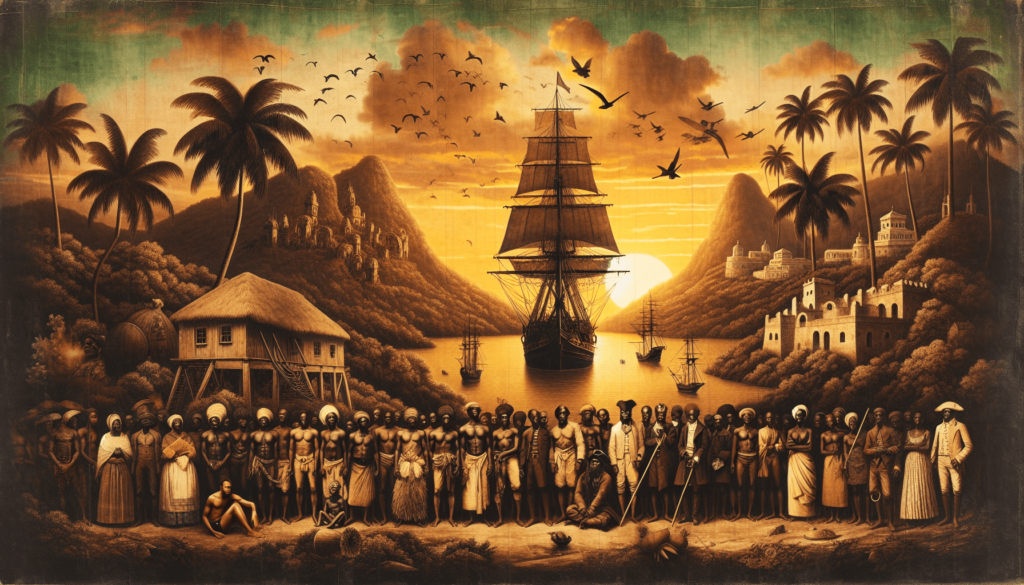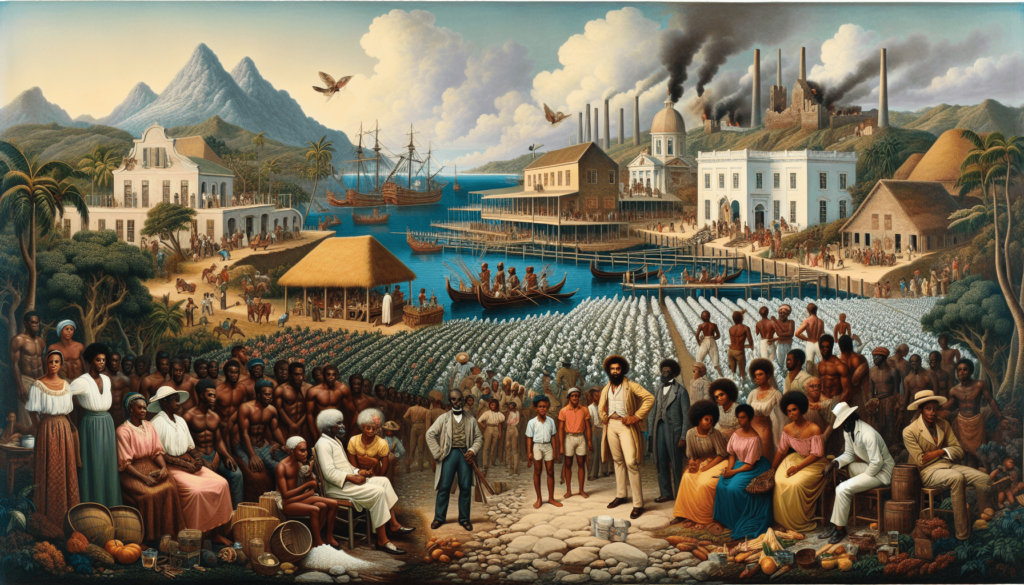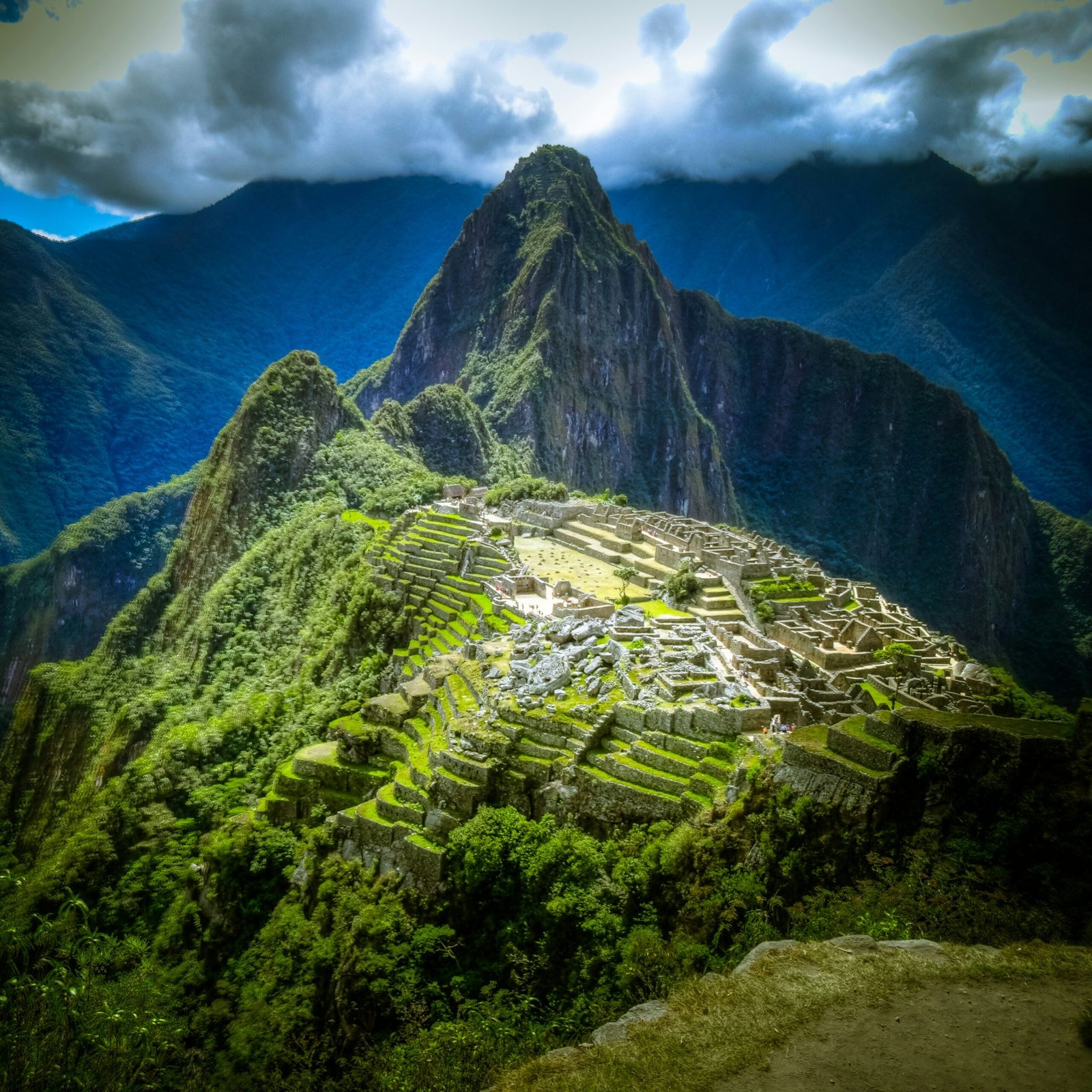Ready to explore the profound impact that colonialism had on the Caribbean? Brace yourself for a captivating journey into history, where you’ll unravel the ways in which colonization transformed this vibrant region. From cultural assimilation to economic exploitation, the Caribbean’s experience with colonial powers shaped its identity, leaving a lasting legacy that still echoes through the islands today. So hop on board as we embark on an eye-opening exploration of the long-lasting effects of colonialism in the Caribbean. Get ready to witness an enthralling tale of conquest, resistance, and the resilience of a people. Hold tight, adventure awaits!

Economic Exploitation
Slavery and Plantation Economy
The economic impact of colonialism on the Caribbean was profound, with one of the most significant aspects being the establishment of slavery and the development of plantation economies. The European powers, namely Spain, Britain, France, and the Netherlands, relied heavily on the exploitation of enslaved Africans to work in the sugarcane, tobacco, and cotton plantations that dominated the region.
Enslaved Africans were treated as commodities, brutally forced to work under inhumane conditions for the profit of their European masters. This system not only brought immense wealth to the colonial powers but also stripped the enslaved individuals of their humanity, dignity, and basic rights. The profitability of the plantation economies was built on the backs of these enslaved people, who were subjected to physical and psychological abuse, dehumanization, and death.
Dependence on Cash Crops
In order to sustain their economies and maximize profits, the colonial powers in the Caribbean focused on the cultivation of cash crops, primarily sugarcane. This reliance on single cash crops contributed to the region’s economic vulnerability as it left them heavily dependent on global market fluctuations for their prosperity. Any adverse changes in demand or prices could lead to economic crises and a decline in living standards for the local population.
Furthermore, the emphasis on cash crops often resulted in the neglect of food crops and agricultural diversity, leaving the Caribbean countries reliant on imported food. This, in turn, made them susceptible to food insecurity and increased their vulnerability to external factors such as natural disasters or disruptions in international trade.
Limited Industrial Development
Colonial rule in the Caribbean hindered the region’s industrial development. The European powers focused on extracting raw materials and resources from the colonies to fuel their own industrialization, rather than fostering local industries. This limited access to capital, technology, and resources for the local Caribbean population, and hindered their ability to develop a diverse and self-sustaining economy.
Consequently, the Caribbean nations faced a lack of economic diversification and remained heavily dependent on the export of primary goods. This dependency, coupled with exploitative trade practices and unequal terms of engagement imposed by the colonial powers, perpetuated a cycle of economic underdevelopment and limited opportunities for the local population.
Social Effects
Cultural Erasure and Assimilation
Colonialism had devastating consequences on the cultural fabric of the Caribbean. The arrival of European colonizers sparked the erasure and assimilation of indigenous cultures, languages, and traditions. European powers viewed the local cultures as inferior and sought to impose their own values, beliefs, and language upon the Caribbean population.
Through systems of forced assimilation and cultural suppression, indigenous practices and knowledge were pushed to the margins, leaving a lasting impact on the identity and sense of belonging of the Caribbean people. Many indigenous languages were lost over time, replaced by European languages, and traditional cultural practices were actively discouraged or forbidden.
Social Hierarchies and Discrimination
Colonial rule created deeply entrenched social hierarchies and discrimination in the Caribbean. European colonizers occupied the top positions in society, enjoying privileges and power, while the indigenous populations and enslaved African people were marginalized and denied equal rights and opportunities.
This legacy of social inequality and discrimination continues to shape Caribbean societies today, with racial and social disparities still evident. The impact of colonialism can be seen in the uneven distribution of wealth, access to education, healthcare, and opportunities, further exacerbating social divisions and hindering social mobility for certain groups.
Loss of Indigenous Knowledge
The colonial era brought about a significant loss of indigenous knowledge in the Caribbean. The traditional knowledge, practices, and wisdom of the indigenous peoples, accumulated over centuries, were disregarded and marginalized by the European colonizers. This loss not only led to the erosion of valuable cultural heritage but also affected the sustainable practices and relationship with the natural environment that indigenous communities had developed.
The disregard for indigenous knowledge perpetuated the idea that European knowledge and practices were superior, leading to the neglect of traditional medicinal systems, agricultural techniques, and sustainable resource management. As a result, the Caribbean region lost a wealth of knowledge and practices that could have been essential for the preservation of its environment and the well-being of its people.
Political Consequences
Colonial Rule and Governance
The political consequences of colonialism in the Caribbean were profound. The European powers established direct control over the region, imposing colonial rule and governance systems that served their own interests. Local populations were denied political agency and the ability to determine their own destinies.
Colonial governance was often characterized by authoritarianism, favoring European settlers and suppressing local voices of dissent or self-determination. Political power was concentrated in the hands of colonial administrators, who acted as intermediaries between the Caribbean and the European powers. This lack of political autonomy and representation led to the systematic oppression and marginalization of the local population.
Undermining of Local Institutions
Colonialism undermined the existing governance structures and institutions in the Caribbean. The European powers sought to establish their own systems of administration, law, and justice, often disregarding and eroding the local institutions that had existed prior to their arrival.
Local chiefs, rulers, and traditional systems of governance were often disregarded, leading to a loss of traditional decision-making processes and institutional knowledge. This dismantling of local institutions created a power imbalance, with the European colonizers exerting control and authority over the Caribbean population while undermining their own systems of self-governance.
Resistance and Independence Movements
Despite the oppressive nature of colonial rule, the Caribbean region was not devoid of resistance and independence movements. The legacy of exploitation and abuse fueled the fight for freedom and self-determination among the local population.
Over time, Caribbean individuals and communities began to organize themselves in movements advocating for their rights and independence. Figures such as Toussaint Louverture, Marcus Garvey, and Nanny of the Maroons became symbols of resistance and liberation, inspiring future generations to challenge the colonial powers.
These movements eventually led to the overthrow of colonial rule and the establishment of independent nations in the Caribbean. However, the impacts of colonialism and the challenges of decolonization continue to shape the political landscape and dynamics of the region.
Environmental Impact
Deforestation and Environmental Degradation
Colonialism had a significant environmental impact on the Caribbean, with deforestation and environmental degradation being major consequences. The demands of the plantation economies, coupled with the extraction of timber and other resources, led to widespread deforestation across the region.
Forests were cleared to make way for plantations, resulting in the loss of biodiversity, degradation of watersheds, and the destruction of natural habitats. The loss of forests also contributed to soil erosion and increased the vulnerability of the Caribbean to natural disasters such as hurricanes.
Introduction of Invasive Species
Through colonialism, the Caribbean was exposed to the introduction of invasive species. European powers often brought non-native flora and fauna to the region, which disrupted the delicate ecological balance and further contributed to the decline in biodiversity.
Invasive species, such as rats, cats, and mongoose, were inadvertently or deliberately introduced by the colonial powers. These species had a detrimental impact on native plant and animal species, leading to significant ecological changes and the displacement of indigenous flora and fauna. To this day, the Caribbean continues to struggle with the ecological consequences of invasive species introduced during the colonial era.
Loss of Biodiversity
The environmental consequences of colonialism were not limited to deforestation and the introduction of invasive species. The exploitation of the Caribbean’s natural resources also had severe implications for biodiversity.
The razing of forests, destruction of coral reefs, and overhunting of wildlife led to a decline in the region’s biological diversity. Many endemic species became endangered or extinct, disrupting intricate ecological relationships and reducing the resilience of the Caribbean’s ecosystems. This loss of biodiversity has negative implications not only for the environment but also for the cultural identity and sustainable development of the region.

Health and Disease
Impact of New Diseases
Colonialism brought about significant health challenges for the Caribbean population. The arrival of European colonizers and their interactions with the indigenous peoples and enslaved Africans introduced new diseases to the region, to which the local populations had no immunity.
Diseases such as smallpox, malaria, and tuberculosis ravaged the Caribbean, causing widespread death and suffering. Indigenous populations were particularly vulnerable, as their lack of exposure to these diseases made them more susceptible to infection and mortality.
Abuse of Indigenous Medicinal Knowledge
Colonialism also resulted in the abuse and suppression of indigenous medicinal knowledge in the Caribbean. European colonizers considered traditional healing practices and medicinal knowledge as backward and superstitious, dismissing the extensive knowledge that indigenous communities had acquired over generations.
This disregard for indigenous healing practices undermined the health and well-being of the local population. Traditional remedies and holistic approaches were replaced by Western medicine, often forcibly imposed on the Caribbean communities. The loss of indigenous medicinal knowledge perpetuated healthcare disparities and limited the accessibility and affordability of healthcare for the Caribbean population.
Healthcare System Disparities
Colonialism contributed to the creation of healthcare system disparities in the Caribbean. The European powers focused on providing healthcare primarily for their own settlers and military personnel, neglecting the health needs of the local population.
Healthcare infrastructure, resources, and services were often inadequate or inaccessible for the majority of Caribbean individuals. This lack of investment in public health and healthcare exacerbated existing health disparities, leaving the Caribbean population vulnerable to diseases and impacting their overall well-being.
Demographic Changes
Mass Population Displacement
Colonialism in the Caribbean resulted in mass population displacement, with devastating consequences for the indigenous peoples and the enslaved African population. The arrival of European colonizers led to the decimation of indigenous communities through conflict, disease, and forced relocations.
Furthermore, the demand for labor in the plantation economies led to the forced migration and enslavement of millions of Africans. The Atlantic slave trade uprooted individuals from their homelands and forcibly transplanted them to the Caribbean, resulting in the displacement of entire communities and severing their ties to their ancestral lands.
Migrations and Cultural Mixing
Despite the forced migration and displacement caused by colonialism, there were also subsequent migrations within the Caribbean. Once slavery ended, labor was sought from other regions such as India and China, resulting in the arrival of Indian indentured laborers and Chinese immigrants. These migrations, along with the ongoing movement within the Caribbean itself, created a diverse and culturally vibrant region.
The mixing of different cultures, languages, and traditions shaped the unique identities of the Caribbean nations. It created rich cultural landscapes, including the development of new languages such as creoles, and contributed to the multicultural tapestry that defines the Caribbean today.
Legacy of Slavery
The legacy of slavery is deeply ingrained in the Caribbean’s demographic makeup and social structure. The region’s populations bear the marks of the forced migration and displacement of the African diaspora, as well as the subsequent migrations of indentured laborers from other regions.
The impact of slavery is evident not only in the racial diversity and the presence of African traditions, but also in the persistent inequalities and socio-economic disparities experienced by different racial groups in the Caribbean. The legacy of slavery continues to shape the collective memory and societal structures of the region, reminding us of the enduring consequences of colonialism.

Education and Intellectual Suppression
Limited Access to Education
Colonialism limited access to education in the Caribbean. The European powers focused on educating a small elite class, primarily the children of European settlers, while denying educational opportunities to the majority of the local population.
Schools were established to serve the interests of the colonial powers, promoting their values, languages, and worldview. This limited access to education perpetuated social inequalities and hindered the intellectual and social advancement of the Caribbean population.
Controlled Curriculum
Colonial rule in the Caribbean also brought about a control over the curriculum taught in schools. The European powers imposed their own educational systems, with a curriculum that aimed to assimilate Caribbean individuals into European culture and values.
Indigenous cultures and local history were often marginalized or completely disregarded, while European history, literature, and languages were privileged. This controlled curriculum not only discouraged the exploration and preservation of the Caribbean’s own cultural heritage but also limited critical thinking and independent thought among the local population.
Suppression of Intellectual Dissent
Colonialism also brought about the suppression of intellectual dissent in the Caribbean. The European powers sought to maintain their authority and control over the narrative, leading to the censorship and repression of intellectual discourse and dissenting ideas.
Major thinkers, writers, and activists who spoke out against colonialism and advocated for social and political change often faced severe consequences, including imprisonment or exile. This suppression of intellectual dissent limited the development of a vibrant intellectual and cultural scene in the Caribbean and hindered the progress towards social justice and transformation.
Infrastructure and Development
Exploitative Infrastructure Projects
Colonialism in the Caribbean led to the development of infrastructure projects that were exploitative in nature. The European powers focused on constructing infrastructure, such as ports, roads, and railroads, but primarily to serve their own economic interests, rather than the needs of the local population.
These infrastructure projects were often designed to facilitate the extraction and export of raw materials, without considering the long-term development and sustainability of the Caribbean. Local communities and their needs were disregarded, and the infrastructure primarily benefited the colonial powers.
Limited Investment in Public Services
Colonial rule in the Caribbean resulted in limited investment in public services. The European powers prioritized their own needs and interests, often neglecting the development of basic services essential for the well-being and development of the Caribbean population.
Access to quality healthcare, education, clean water, sanitation, and housing was limited for many Caribbean individuals. This lack of investment in public services perpetuated socio-economic disparities and hindered the development of the region.
Legacy of Neglected Infrastructure
The legacy of colonialism is still evident in the neglected infrastructure of the Caribbean. Many countries in the region continue to grapple with inadequate transportation networks, outdated utilities, and substandard public services.
This neglect has hindered economic development, contributed to social inequalities, and limited the region’s ability to adapt to the challenges of the modern world. The effects of colonial rule on infrastructure are still felt today, necessitating efforts to address the legacy of neglect and invest in sustainable infrastructure development.

Language and Identity
Lingual Suppression and Loss
Colonialism in the Caribbean brought about the suppression and loss of indigenous languages. The European powers imposed their languages, primarily English, Spanish, French, and Dutch, as the official languages of the colonies, leading to the marginalization and decline of indigenous languages.
Generations of Caribbean individuals faced pressure to abandon their native languages in favor of the languages of the colonizers. The loss of language resulted in the erosion of cultural identity and disrupted intergenerational transmission of cultural knowledge and traditions.
Creation of Creole Languages
As a response to the suppression of their native languages, the Caribbean population developed creole languages. Creole languages emerged as a means of communication that combined elements of the colonizers’ languages with the African and indigenous languages. These creole languages became an essential part of Caribbean identity and culture.
The creation of creole languages showcased the resilience and creativity of the Caribbean people in the face of linguistic suppression. Today, creole languages form an integral part of the region’s cultural heritage and are recognized as important symbols of identity.
Cultural Identity Crisis
The impact of colonialism in the Caribbean resulted in a cultural identity crisis for many individuals and communities. The forced assimilation into European cultures and the marginalization of indigenous traditions and knowledge left the Caribbean population grappling with questions of identity and belonging.
Caribbean individuals often find themselves navigating multiple cultural influences and grappling with the legacies of colonialism. The search for a sense of cultural identity and the preservation of cultural heritage remain ongoing struggles for many in the Caribbean region.
Legacy of Colonialism
Persistent Issues and Inequalities
The legacy of colonialism continues to shape the Caribbean, with persistent issues and inequalities being a constant reminder of its impact. The socio-economic disparities, racial divisions, and social hierarchies that were established during the colonial era still manifest in the region today.
The unequal distribution of wealth, limited opportunities for social mobility, and a lack of representation in decision-making processes perpetuate the legacies of colonial rule. Efforts to address these persistent issues and promote social justice remain critical for the Caribbean nations.
Post-Colonial Dependency Syndrome
Colonialism in the Caribbean fostered a post-colonial dependency syndrome, as the region continues to grapple with the impacts of exploitation and external control. The European powers extracted the region’s resources, developed one-dimensional economies, and perpetuated a cycle of dependence on external aid and trade.
This dependency syndrome hinders the ability of Caribbean nations to fully exercise their sovereignty and control over their own destinies. Breaking free from the economic, political, and cultural dependencies imposed during colonialism remains a significant challenge for the Caribbean countries.
Challenges of Decolonization
Decolonization, while marking a significant step towards independence for the Caribbean nations, brought about its own set of challenges. The process of decolonization was often fraught with political, social, and economic instability, as the newly independent nations grappled with establishing governance structures, building economies, and addressing the legacies of colonial rule.
The challenges of decolonization include nation-building, fostering regional cooperation, addressing social inequalities, and achieving self-sustainable development. The impacts of colonialism continue to shape the post-colonial Caribbean, necessitating ongoing efforts to overcome the challenges and create a more equitable and just society.
In conclusion, colonialism had a profound and lasting impact on the Caribbean. The economic exploitation, social upheaval, political oppression, environmental degradation, health challenges, demographic changes, education suppression, infrastructure neglect, language loss, and the enduring legacies of colonialism have shaped the Caribbean’s history, culture, and society. Understanding and addressing these consequences are essential in envisioning a more just and equitable future for the Caribbean nations, as they continue to grapple with the challenges of post-colonial development and decolonization.



